Where do 50% of homeowners look for a contractor? The answer: Online.
If your construction business isn’t highly visible across the web, you’ll miss hundreds (maybe even thousands!) of leads in your area who desperately need your services.
Thankfully, a strong online presence can be engineered.
With the right mix of SEO, a professional website, social media marketing, and targeted PPC, you can attract qualified clients all year long: even while your competitors struggle during those stressfully slow seasons.
In this guide, we’ll walk you through the exact strategies our team uses to help construction clients fill their pipelines — and see up to 800% ROI in some cases. Keep scrolling.
Why Construction Marketing Matters
You know the construction industry rewards firms that deliver, communicate, and de-risk. But here’s the big question: what if the right people never even see you? That’s where effective construction marketing comes in. It connects your business with the exact target market that values your expertise, and it proves before a bid goes out that you’re the safe choice. For homeowners, that proof is often before-and-after photos, online reviews, and a responsive team they feel good about.
Did you know 98% of consumers read reviews for local businesses, and 87% say reviews directly impact their decision?
For developers and industry partners, trust comes from clear proposals, safety metrics, and projects that match their goals. The right marketing builds trust and turns attention into new business.
Get a Construction Marketing Blueprint (Free)
Firms that follow a clear 90-day marketing plan see up to 2-4X more qualified project inquiries.
22 High-Impact Construction Marketing Ideas
Want to grow your construction business without wasting time or money? You need a focused strategy that connects your marketing to the right clients. Thankfully, these 22 ideas will help.
1. Goals, Ideal Clients, and Service Focus
Are you clear on exactly who your ideal clients are and what kind of projects you want more of? If not, now’s the time to get focused. Define your service focus and set real goals, maybe it’s booked site visits, signed contracts, or more leads in a specific category.
Are you a general contractor who thrives in healthcare TI? A remodeler who nails $60k+ kitchens? Say it. This clarity makes your construction industry marketing, digital advertising, and team decisions way easier and way more effective.
2. Budget, Channel Mix, and Measurement
Healthy construction companies invest consistently, often 5-12% of revenue, spread across three buckets:
- Demand capture: search engine optimization, local SEO, PPC
- Demand creation: social media marketing, PR, traditional marketing, signage, brand awareness
- Retention: email, reviews, repeat customers
Connect every marketing channel to your CRM. Track calls, forms, qualified opportunities, and revenue so you can double down on winners and retire what isn’t working.
Find the best construction marketing software to streamline your marketing efforts—read our top picks!
3. Build a Professional Website That Converts
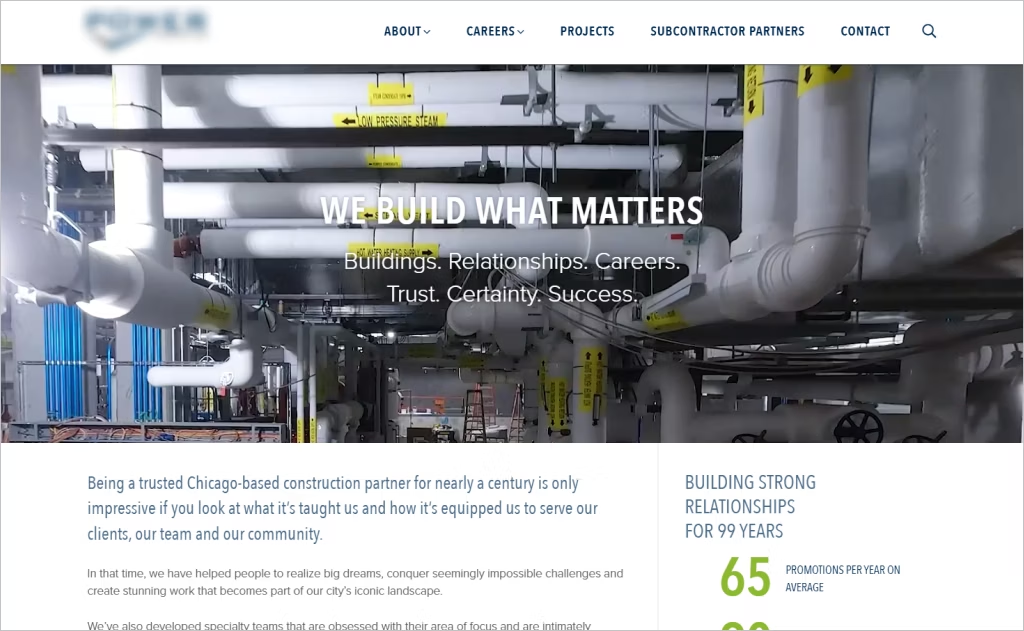
When a prospective client lands on your website, what kind of impression do they get? Does your site reflect the quality of your work? If you want a strong online presence, your website needs to load fast, feel trustworthy, and guide people easily from “just browsing” to “booked site visit.” Thankfully, it’s not that complicated.
Use plain language to walk them through your process, from preconstruction to punch list, so they know exactly what to expect. Show off high-quality images of real projects, and give context: budget ranges, materials, timelines. Make it easy to connect with your company. Keep a “Book a Site Visit” button on every page and offer SMS or chat for people on the go.
Want inspiration? Look at examples of best construction websites.
Build pages for key cities and neighborhoods, respond fast, use before-and-after photos, and throw in a budget calculator. Add yard signs and postcards, and nearby customers are your best next clients.
4. Search Engine Optimization That Wins Locally

When someone needs a contractor, will your company show up? That’s where good search engine optimization comes in. Start by building clear service pages focused on the work you want more of, like tenant improvements, ADUs, custom homes, or concrete foundations. Then, add city pages to help with local SEO so you show up for searches like “contractor near me.”
Have you updated your Google Business Profile lately? Make sure it includes the right categories, service areas, and project updates. And don’t be shy, ask partners to link to your case studies. That’s how potential clients find you.
Read the key steps behind effective construction SEO and how to implement them.
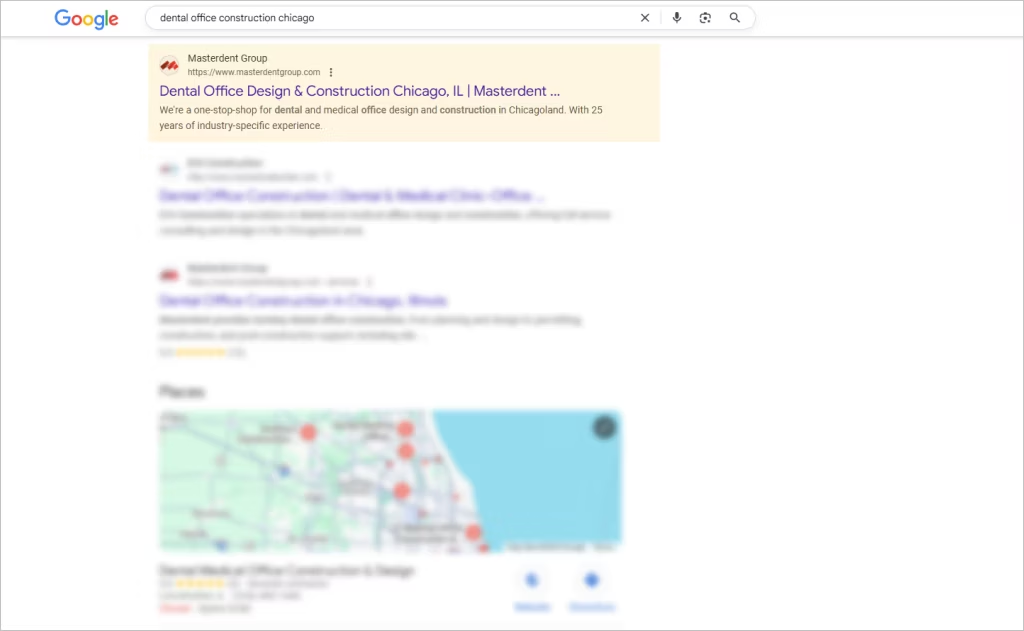
Case Study: 6-Month Traffic Boost for Masterdent
Masterdent struggled with low search rankings and lacked lead generation on their website. By optimizing their site for local SEO and improving their Google Business Profile, we helped them achieve a 50% decrease in cost per lead and a 22,400% increase in organic traffic. They are now ranked #1 for “dental office construction” in Chicago. Ready for results like this?
Elevate Your Website Conversions
Contractors who optimize their website and CTAs increase conversions by 30–70%.
5. Publish Case Studies That Show Outcomes
A tight, honest case study beats a glossy brochure. Document the challenge, your approach, the schedule, and the result. Include relevant construction materials you specified and why, a brief note on safety and QA/QC, and a quote from the owner or architect.
Keep it skimmable but substantial enough that an estimator or facilities manager could use it internally. When construction firms see projects like theirs, trust rises, and so do RFP invites.
6. Use High-Quality Images, Videos, and Before-and-After Photos
Great marketing for a construction company starts with showing, not just telling. Capture each standout project with care: think tile lines, trim details, clean mechanical rooms, and sharp control joints. Before-and-after photos and short vertical videos help future clients see the transformation.
Want to go further? Use drone shots or time-lapse clips to tell the story without saying a word. These visuals power your website, ads, social posts, and help future clients feel confident in the quality you bring to every project.
7. Run Pay-Per-Click and Local Services Ads
When someone searches “commercial GC in [city]” or “kitchen remodel [city],” will they find you first? A well-placed pay-per-click ad can make sure they do. Focus on high-intent keywords tied to your most profitable work. Write ad copy that speaks to real results — on-time schedules, clean jobsites, and clear change orders. Use a unique tracking number for each campaign so you know what’s working.
Pair PPC with Google Local Services Ads so you only pay for actual calls and messages from potential customers. When done right, this combo turns clicks into real conversations, and those conversations lead to your next project.
In competitive bids, when prices are close, brand recognition and a proven track record often become the deciding factor. That’s why great construction advertising should showcase real construction services, past projects, and the people behind the work. Help clients picture working with you—and picture success.
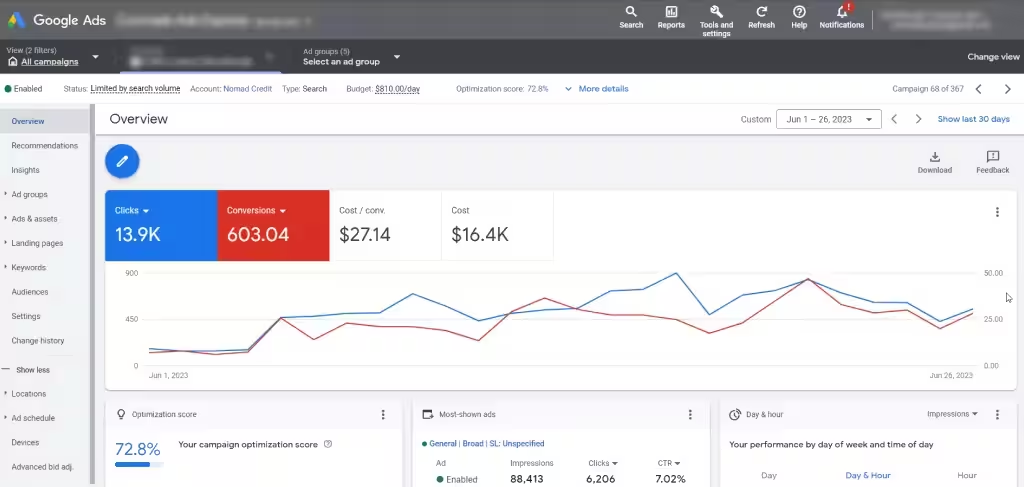
Struggling to get noticed? PPC for contractors gets your services in front of the right people.
8. Treat Social Media Marketing Like a Booking Channel
Social media can be more than just a highlight reel — are you using it to drive real results? On Instagram and Facebook, show off your project progress, craftsmanship, and involvement in the community. On LinkedIn, speak to industry professionals by sharing milestones, safety culture wins, and team promotions.
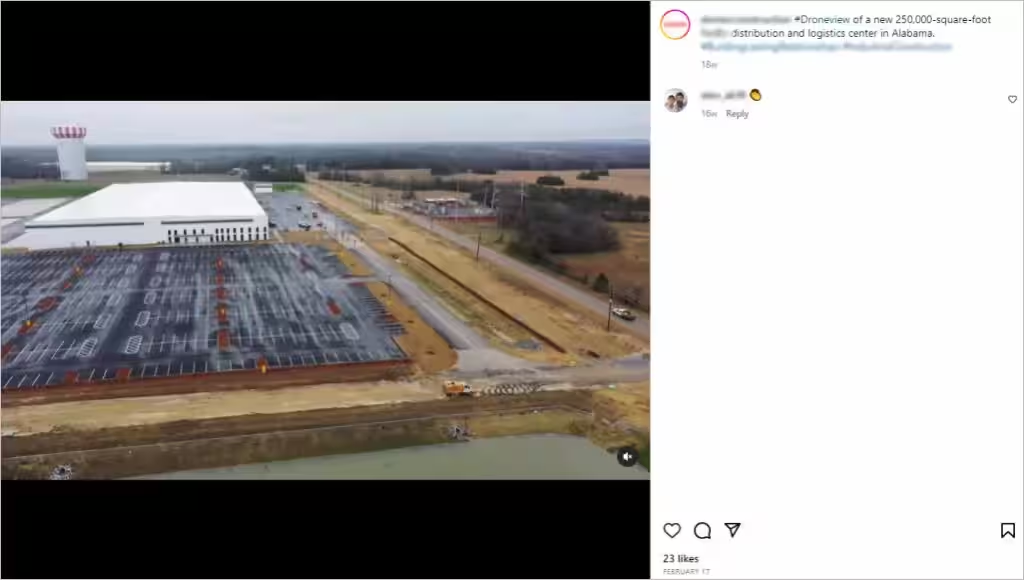
Always give people a clear next step. Instead of a vague “learn more,” invite them to schedule a walkthrough, DM for an estimate range, or download a preconstruction checklist.
To build trust and authority, share posts that reduce risk and show how your team operates. Thought leadership around delivery methods, scheduling, and value engineering turns your social media into a real marketing channel.
Don’t miss out on social media! Learn how social media marketing for construction companies can bring in more leads.
Residential vs Commercial Construction Marketing
First impressions matter, especially in construction. Residential buyers often scroll through social media, ask neighbors, and judge you by your visuals and how fast you reply. A clean, professional website, active social media, and quick responses go a long way.
Speed counts: leads contacted within 5 minutes are up to 9X more likely to convert than those after 30.
Commercial and public buyers look for different signals — schedule control, QA/QC, staff resumes, and a clear process for completing projects. They compare construction contractors by how well they communicate methods, logistics, and risk. Your marketing materials need to speak to both.
Turn Your Social Media Into a Real Lead Machine
Construction companies that use structured social funnels see up to 3X more booked walkthroughs from Instagram, Facebook, and LinkedIn.
9. Email Nurture and Automated Follow-Ups
Most leads won’t book right away — and that’s okay. A simple email sequence helps you stay top of mind. Start with a warm welcome that explains your process. Then share project examples that match their interest, followed by something useful like a budget guide or timeline overview. Finish with a clear “Book a Site Visit” link.
After construction, don’t go silent. Send maintenance tips or warranty reminders. This steady, helpful follow-up enhances the customer experience and keeps existing customers coming back.
Connect with your clients directly through email marketing for contractors — get the best strategies now!
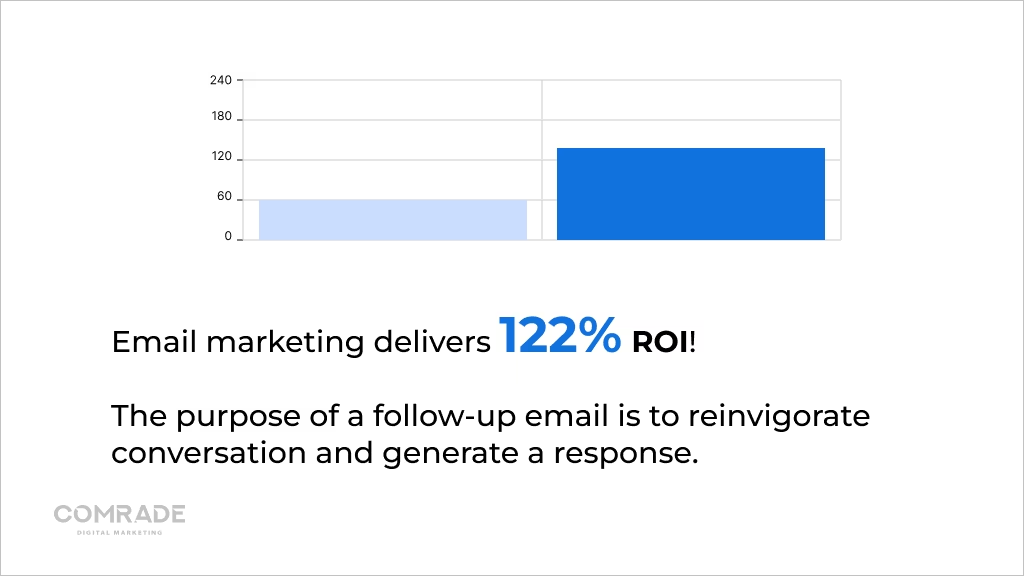
10. Review Engine and Referral Program
Reviews are public references. Ask for them right after you wrap a punch list, and make it easy for clients with a direct Google link. When they leave one, you should always respond with genuine thanks and details that show future readers how you work.
A small thank-you, gift card, donation, or service credit goes a long way. It turns happy customers into advocates for your business. Over time, this “reputation flywheel” compounds, bringing in more inbound inquiries without increasing your ad spend.
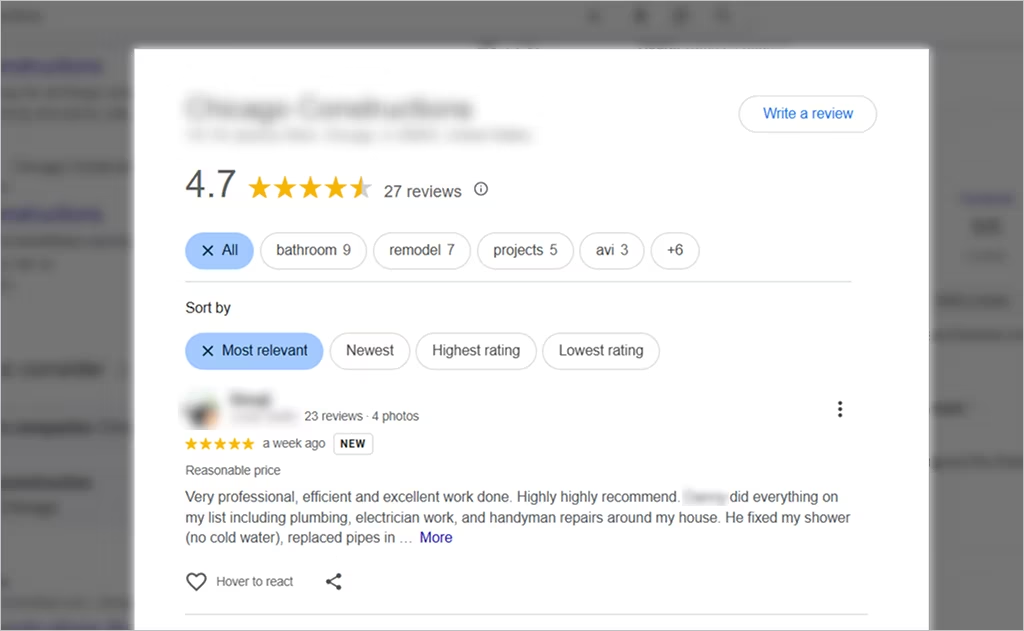
11. Partnerships with Architects, Designers, and Suppliers
Who’s helping you grow beyond your own team? Strong industry partners can take you further. Co-author project spotlights, swap backlinks, or host lunch-and-learns that offer real value.
In residential, team up with interior designers to create cohesive packages.
In a commercial, align with engineers or trades. These partnerships create trust, open doors, and make your project proposals stand out from the start.
12. Proposal and RFP Excellence
For general contractors and specialty contractors, the proposal is often where you win the work. Craft templates that open with a project goal summary, then show schedule, logistics, safety plans, QA/QC, and clear alternates.
Tailor team bios to mirror the exact scope; highlight past projects that match. When your narrative explains how you’ll de-risk the job, owners feel safer choosing you, even if you’re not the lowest bid.
Does Your Website Use Case Studies?
Decision-makers say strong case studies increase trust and RFP invites by 60%+.
13. Jobsite Branding and Local Events
Your jobsites are highly visible billboards — are you making the most of them? Clean fence wraps, branded signage, and a QR code to your estimate page can turn drive-by curiosity into real leads. Show up at local events, sponsor youth sports, or support trade schools and Habitat builds.
Hit the right trade shows and follow up with case studies tailored to each target audience. These local and community touchpoints bring your brand to life and build lasting connections.
14. Direct Mail Around Active Projects
Old-school does not mean outdated. In the marketing for the construction industry, a simple postcard showing an in-progress or completed project, a brief description, and a direct scheduling link can drive responses from neighbors who already trust what they’ve seen. These drops when work is active, and the site is tidy. It’s traditional marketing that works because it’s relevant, tangible, and close to home.
15. PR, Awards, and Trade Shows
Are the right people in your market seeing your business? Visibility builds credibility, especially in this space. Share groundbreakings, ribbon cuttings, and project completions with local business media. Have you entered for any awards lately? Even just being nominated boosts your brand.
Heading to trade shows? Set meetings in advance, run a looping project reel at your booth, and follow up fast. Smart PR and marketing for construction companies keep you top of mind with industry leaders and potential clients.
16. Directory Optimization for Construction Firms
Many potential customers browse Houzz, Yelp, Angi, BuildZoom, and The Blue Book before they call. Keep profiles consistent and photo-rich, list specialties clearly, and ask partners to endorse you for specific scopes. A tidy directory footprint complements local SEO and nudges undecided browsers to reach out.
Fix the Marketing Gaps Costing You Projects
Most construction firms waste 25-40% of their marketing budget on the wrong channels.
17. Financing Options and Instant Estimate Ranges
In marketing in construction, budget anxiety often stalls decisions. Offering financing options and an instant estimate range, clearly labeled as preliminary, can help homeowners and small businesses take the next step. You’re not committing to a final number; you’re showing a path forward. When combined with a clear process page, this transparency builds trust quickly.
18. Interactive Project Map and Project Updates
What if your portfolio actually helped sell your next job? Turn it into a clickable map so visitors can explore projects by neighborhood or sector. Where have you already earned trust? Add quick project updates for active jobs. Let people see your progress and professionalism in real time. It’s an easy way to boost engagement and make your construction business stand out.
19. Employer Branding for Recruiting and Marketing Teams
Great teams deliver great customer experiences. Share training programs, apprenticeships, and safety milestones on your site and social media. A strong careers page and culture content helps you recruit, and it quietly signals to clients that your operation is stable and skilled. In the competitive industry for talent, employer branding is also brand development.
20. Social Proof Walls and Customer Experience Stories
What do others say about working with you? Are you making that easy to find? Collect testimonials, star ratings, press mentions, and awards all in one place. Add photos or short videos to bring each quote to life. Highlight real project challenges — tight sites, renovations, budget limits. This kind of social proof lowers buyer risk and gives your marketing staff real ammo during sales conversations.
Get More Reviews, Referrals & Repeat Clients
Construction companies with strong review systems earn 2–3× more inbound calls.
21. Conversion Rate Optimization Across the Funnel
Sometimes the smallest changes create the biggest gains for your pipeline. Shorten your forms to just the essentials, place trust badges near your buttons, and test different CTAs — “Book a Site Visit,” “Request a Guaranteed Start Date,” “Schedule a Precon Call.”
Use heatmaps to spot where prospects hesitate, then make small improvements each month. When you invest in CRO, every marketing channel you run becomes more efficient.
Learn what top construction marketing agencies do to increase visibility and drive consistent projects.
22. Analytics That Tie Marketing Efforts to Revenue
Forget the guesswork — make marketing decisions based on real numbers. Track where your inquiries, booked visits, proposals, and wins are coming from. Score calls, coach your team, and create a simple dashboard your leadership can review in seconds.
If a campaign brings in profitable work, double down. If not, tweak it or cut it. This kind of discipline keeps your marketing strategies tightly aligned with real business results.
A Practical 90-Day Rollout for Construction Companies
Month one is all about the basics. Refresh your professional website, fix local SEO issues, update your Google Business Profile, and connect call tracking and your CRM. Photograph two recent projects, write one strong case study, and start asking for reviews with a simple system.
Month two focuses on demand capture. Launch PPC and Local Services Ads for your top three services, publish two helpful posts answering client questions, and start a five-email nurture sequence.
Month three builds momentum. Add jobsite signage with QR codes, host a short webinar or open house, co-create a partner spotlight, and shift budget toward what’s driving real business.
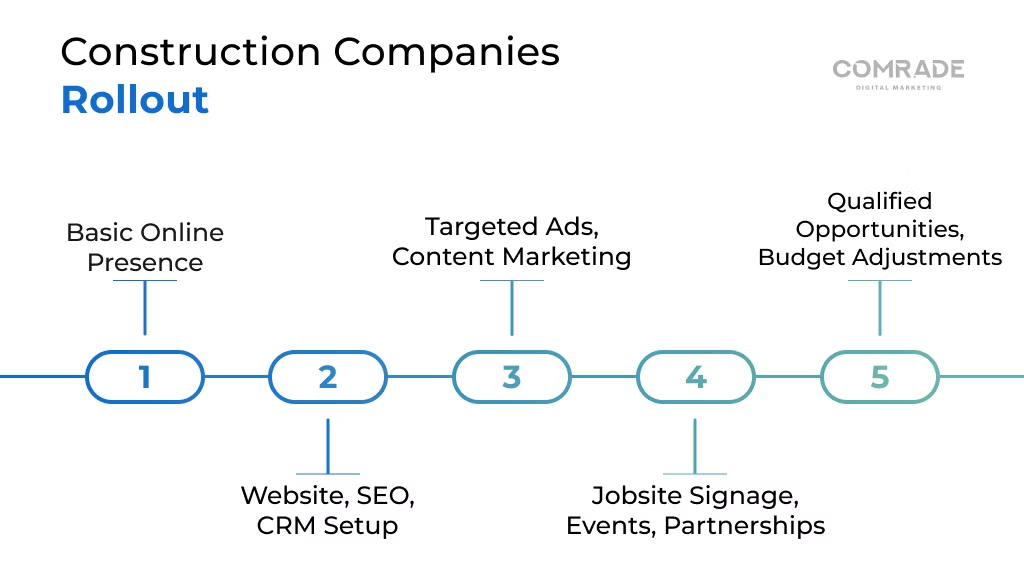
Ready to 2.5x Your Lead Generation?
Join 330+ contractors who've transformed their business with our proven marketing strategies
Conclusion: A Construction Marketing Strategy You’ll Actually Use
A winning construction marketing strategy lives in your weekly habits. A fast, trustworthy website, strong local SEO, proof-filled case studies, and PPC or LSAs that turn searches into real site visits. That’s how you consistently show up and stand out.
Track calls, walkthroughs, proposals, wins, and revenue by channel. Shift budget to what’s working. Fix one bottleneck each month. Over time, your construction company becomes the safe, obvious choice in a competitive market.
Want a shortcut? Get a free 30-minute Construction Marketing Blueprint — custom SEO, PPC, and conversion fixes. Book your call now.
FAQs
-
What’s the fastest way for a construction business to generate leads?
Turn on pay-per-click search ads and Local Services Ads for your top services and cities, and answer every inquiry within minutes. Pair with a tuned Google Business Profile and fresh reviews.
-
How much should construction companies invest in marketing?
Many construction firms see results investing 5–12% of revenue, tilted toward SEO and PPC at first, then shifting toward content, referrals, and brand development as momentum grows.
-
Which social platforms work best for construction companies?
Instagram and Facebook excel for residential; LinkedIn works for commercial and public work. Choose the platform your target audience already uses and post with a clear call to action.
-
How do we make proposals more persuasive?
Tailor bios to the scope, outline logistics and schedule clearly, present VE options, and include successful projects with metrics. This de-risks the choice for clients and speeds decisions.
